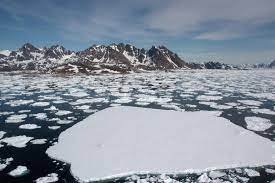
Context
- The Arctic, noted for its frozen expanse and cold temperatures, is undergoing significant modifications as a result of climate change.
- According to recent studies, this Ocean may experience ice-free summer days within the next decade, far earlier than previously thought.
- This blog looks into the conclusions of these research, looking at the ramifications of ice-free summers and the forces driving this unprecedented shift.
The Accelerating Pace of The Arctic Ice Melt
- A study published in the journal Nature Reviews Earth & Environment makes alarming predictions about the demise of Arctic sea ice.
- Researchers predict that ice-free conditions will occur as early as the next decade based on sea ice coverage statistics and climate models.
- The decline in sea ice coverage is ascribed to greenhouse gas emissions, which contribute to rising temperatures and rapid ice melt.
Understanding Ice-Free Arctic Summers
- Contrary to popular belief, a “ice-free” Arctic does not mean the absence of ice, but rather when the ocean has less than a million square kilometers of ice.
- In recent years, the Arctic Ocean has had around 3.3 million square kilometers of sea ice at its minimum in September.
- According to predictions, the Arctic might be ice-free for a whole month in September by 2050, with the possibility of longer durations by the end of the century.
Impact of Greenhouse Gas Emissions
- The Arctic’s tenacity and ability to rebound quickly offer promise, despite negative projections.
- Arctic sea ice can recover in under a decade with successful CO2 reduction policies, unlike Greenland’s gradual creation over thousands of years.
- This emphasizes the significance of developing policies to reduce climate change and reverse warming trends in order to protect the Arctic ecosystem.
Conclusion
- The potential of ice-free summers in the Arctic highlights the urgent need for fast action to combat climate change.
- As researchers warn about the accelerated rate of glacier melt, global stakeholders must prioritize emission reduction efforts and implement sustainable practices to reduce the effects of climate change.
- By protecting the Arctic environment, we can conserve this crucial region while mitigating the far-reaching effects of global warming.
People also ask
Q1: What does it mean for a region to be “ice-free” during summers?
Ans: “Ice-free” refers to a condition where the ocean has less than a million square kilometers of ice. It doesn’t signify the complete absence of ice but rather a significant reduction in sea ice coverage, which has profound implications for the ecosystem and climate patterns.
Q2. Why is the region experiencing accelerated ice melt?
Ans: The primary driver behind the rapid decline in sea ice is attributed to human-induced climate change, particularly the increased concentration of greenhouse gases such as carbon dioxide in the atmosphere. These gases trap heat, leading to rising global temperatures and subsequent melting of polar ice.
Q3: How soon could the region experience ice-free summers?
Ans: Recent studies suggest that ice-free summer days could occur in the region as early as the next decade, with projections indicating a potential month without floating ice during September by 2050. The exact timeline depends on various factors, including future emission scenarios and climate trends.
Q4: What are the consequences of ice-free summers?
Ans: Ice-free summers have far-reaching implications for the ecosystem, wildlife, and communities dependent on ice cover for their livelihoods. Loss of sea ice disrupts marine habitats, threatens species, and alters weather patterns globally, potentially exacerbating climate change impacts.
Q5: Can the region recover from ice-free conditions?
Ans: Despite the alarming projections, the region has shown resilience and the potential for swift recovery under favorable conditions. Unlike the slow formation of permanent ice features, sea ice can regenerate within a decade if effective measures are taken to reduce greenhouse gas emissions and mitigate climate change.
I don’t think the title of your article matches the content lol. Just kidding, mainly because I had some doubts after reading the article.
Your article helped me a lot, is there any more related content? Thanks!
Thanks for sharing. I read many of your blog posts, cool, your blog is very good.
I don’t think the title of your article matches the content lol. Just kidding, mainly because I had some doubts after reading the article.